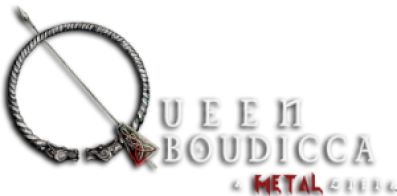The History Behind the Opera – Cameron Earnshaw
As you may or may not know, Queen Boudicca: A Metal Opera is based upon true historical events. Much of the story and the lyrical content was written based on what we know from the records of Tacitus, who was Agricola’s (in our production, Agricola is played by Eddie Shifflet) son-in-law. In fact, were it not for Tacitus’ records, we may not have known of Boudicca’s story at all! Tacitus’ records were so well preserved that we have an accurate record of what Suetonius (played by yours truly) said to his troops during his “pep-talk” before their final confrontation with Boudicca’s army. We’ve got an English translation, but essentially I get to breathe life into the same words that Suetonius actually said all those years ago. How awesome is that?! Channeling the real man’s own words centuries later…pretty cool, if you ask me.
Adapting ancient records to the stage can be a challenge. Part of the allure of theatre is the “suspension of disbelief,” which is the fancy way of saying “making the audience forget that they’re in a theatre because they’re enjoying the story so much.” Maintaining that disbelief can sometimes be a challenge, but we’re using every tool at our disposal to make this opera an unparalleled theatrical experience. Screens and projectors will be used to create the set and scenery instead of using physical set pieces, which has the additional advantage of allowing us to project the lyrics of the growled and screamed vocal parts for the “metal impaired,” as the composer Bob calls them: the members of the audience who may not have as much experience with the harsh vocal style and, as such, may not yet have developed the ear to easily understand the lyrics. For instance, about 90% of Suetonius’ songs are growled, which means that having the lyrics on screen will make sure the audience can follow what he is saying, feeling, and doing. Without the projected lyrics, it can be hard for a new metal fan to fully understand the story.
On the note of technology, a recent trend in theatre is to adorn the actors with headset microphones so they can have their hands free to emote while still having the benefit of amplification. While for speaking and singing this may work wonders, with extreme vocals it presents a series of problems. For the uninitiated, screaming into a microphone changes the sound in more ways than volume: the angle of the mic, position of the hand, how much or little of the microphone is cupped, distance from the mouth, and many other factors contribute to how the sound hits the listeners’ ears. With headset microphones, we have zero control over any of these variables and are at the mercy of one microphone angle and distance. This severely limits us in our diversity with extreme vocals. To combat this, we will likely be using handheld wireless microphones, which may detract slightly from the show’s appearance, but at that point the metal will be SO METAL that you won’t even notice because you’ll be suffering from melted faces and the like. Our director, Carol, has some serious work ahead of her: while most of the cast has had some kind of theatre experience in the past, we’ve also spent the majority of the past few years studying music as opposed to acting. As such, there are some basic acting skills that she’s been teaching us as we enter the staging and blocking phase of production. Her patience with those of us who aren’t as experienced (read: with me) is most welcome. Plus, we’re learning a lot, and learning is fun 😀
Stay tuned for all things Boudicca.
Sacramentum Romanus,
Suetonius
